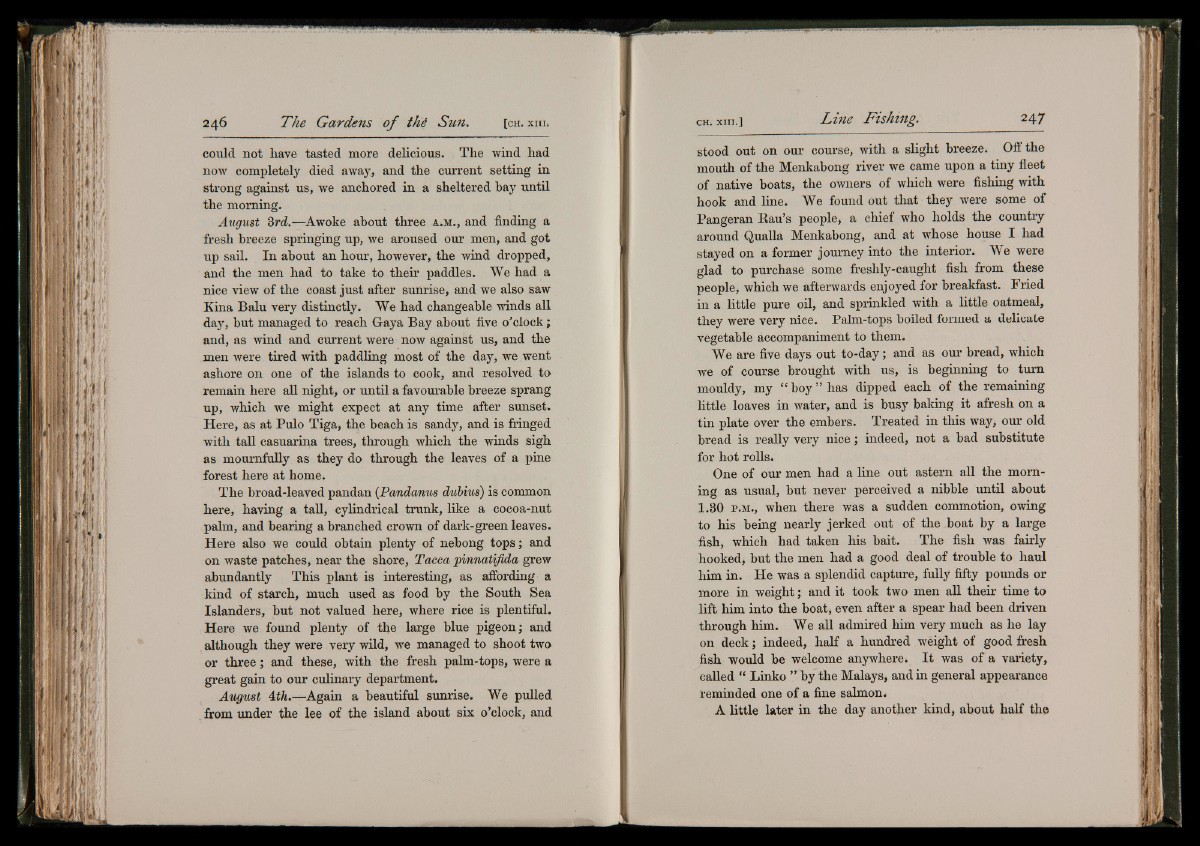
could not have tasted more delicious. The wind had
now completely died away, and the current setting in
strong against us, we anchored in a sheltered bay until
the morning.
August 3rd.—Awoke about three a .m . , and finding a
fresh breeze springing up, we aroused our men, and got
up sail. In about an hour, however, the wind dropped,
and the men had to take to their paddles. We had a
nice view of the coast just after sunrise, and we also saw
Kina Balu very distinctly. We had changeable winds all
day, but managed to reach Gaya Bay about five o’clock;
and, as wind and current were now against us, and the
men were tired with paddling most of the day, we went
ashore on one of the islands to cook, and resolved to
remain here all night, or until a favourable breeze sprang
up, which we might expect at any time after sunset.
Here, as at Pulo Tiga, the beach is sandy, and is fringed
with tall casuarina trees, through which the winds sigh
as mournfully as they do through the leaves of a pine
forest here at home.
The broad-leaved pandan (Pandanus dubius) is common
here, having a tall, cylindrical trunk, like a cocoa-nut
palm, and bearing a branched crown of dark-green leaves.
Here also we could obtain plenty of nebong tops; and
on waste patches, near the shore, Tacca pinnatiftda grew
abundantly This plant is interesting, as affording a
kind of starch, much used as food by the South Sea
Islanders, but not valued here, where rice is plentiful.
Here we found plenty of the large blue pigeon; and
although they were very wild, we managed to shoot two
or three; and these, with the fresh palm-tops, were a
great gain to our culinary department.
August Ath.—Again a beautiful sunrise. We pulled
from under the lee of the island about six o’clock, and
stood out on our course, with a slight breeze. Off the
mouth of the Menkabong river we came upon a tiny fleet
of native boats, the owners of which were fishing with
hook and line. We found out that they were some of
Pangeran Rau’s people, a chief who holds the country
around Qualla Menkabong, and at whose house I had
stayed on a former journey into the interior. We were
glad to purchase some freshly-caught fish from these
people, which we afterwards enjoyed for breakfast. Fried
in a little pure oil, and sprinkled with a little oatmeal,
they were very nice. Palm-tops boiled formed a delicate
vegetable accompaniment to them.
We are five days out to-day; and as our bread, which
we of course brought with us, is beginning to turn
mouldy, my “ boy’’ has dipped each of the remaining
little loaves in water, and is busy baking it afresh on a
tin plate over the embers. Treated in this way, our old
bread is really very n ice; indeed, not a bad substitute
for hot rolls.
One of our men had a line out astern all the morning
as Usual, but never perceived a nibble until about
1.80 p .m ., when there was a sudden commotion, owing
to his being nearly jerked out of the boat by a large
fish, which had taken his bait. The fish was fairly
hooked, but the men had a good deal of trouble to haul
him in. He was a splendid capture, fully fifty pounds or
more in weight; and it took two men all their time to
lift him into the boat, even after a spear had been driven
through him. We all admired him very much as he lay
on deck; indeed, half a hundred weight of good fresh
fish would be welcome anywhere. It was of a variety,
called “ Linko ” by the Malays, and in general appearance
reminded one of a fine salmon.
A little later in the day another kind, about half the